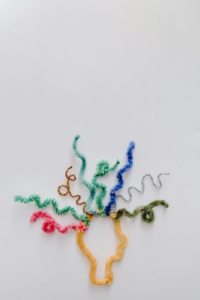Having ADHD often means that we have to adapt our behavior and routines to fit in with our neurotypical families, jobs, or friends. This can be exhausting and make us feel ashamed, frustrated, or hopeless. Most of the time we gravitate towards certain tasks or actions because they help us feel more centered, even when we can’t fully understand why.
It’s helpful to know why certain ADHD coping strategies work for the ADHD brain. Most of the time we know in our heads why doing something is helpful for us, but it’s hard to express to those around us why we need these certain actions or conditions to cope. The more we understand ourselves, the easier it gets to communicate our needs and set boundaries to help us.
Five ADHD Coping Strategies
1. Deadlines
ADHD and procrastination go together like a hand in a glove. It’s not that we want to delay tasks, however big or small they are. It’s rather that we genuinely are not able to focus for long enough to complete the task when there is no deadline on it. When a task has deadlines attached to it, we are more likely to be able to focus on it and try to complete it in time.
 Things like household chores, personal hygiene, tidying, and meal preparation can feel like insurmountable tasks mostly because these things don’t have a deadline to them. Although it might be urgent for us to buy supplies, wash our hair before work tomorrow, or collect the drycleaning before the weekend, we often experience a kind of paralysis with decision-making on personal levels.
Things like household chores, personal hygiene, tidying, and meal preparation can feel like insurmountable tasks mostly because these things don’t have a deadline to them. Although it might be urgent for us to buy supplies, wash our hair before work tomorrow, or collect the drycleaning before the weekend, we often experience a kind of paralysis with decision-making on personal levels.
A helpful hack here could be to invest in a diary or find a useful digital app to prioritize tasks and set deadlines for yourself. This might feel like another step or chore, but it’s worth the few extra minutes each day to look at your planner and determine which tasks are urgent, and which ones you can procrastinate on. Making deadlines for yourself might sound stressful, but the ADHD brain craves order and needs a little bit of pressure to be effective.
2. Organized Chaos
To neurotypical people, an ADHD workspace or home often looks like a chaotic mess. This is because people with ADHD tend to function best when they can see what they need to do. For example, we might prefer to have all of our bathroom products on display so that we can remember to floss and carry out our skincare routine without missing a step. To our partner, this might look like unbearable amounts of clutter.
This can make for a fair bit of tension and even conflict at home or work. Neurotypical people tend to prefer neat surfaces with products and items all packed away out of sight. For the ADHD brain, being out of sight quite often means being out of mind; if we can’t see it, we won’t do it.
It might be necessary to establish our own spaces where we can go and to guard them from others. This could mean that we compromise by having a tidy common area at work or home but maintaining our organized chaos at our workstation, on our side of the bedroom, and a dedicated shelf in the closet. Most of dealing with ADHD involves accepting that we simply function differently from others and that there is no shame in that.
3. Have Clear Directions
 You might have heard that there are different ways of learning, including auditory learning, verbal learning, or kinesthetic learning. This is because people are wired differently, and what works for some doesn’t work for others. Generally, people with ADHD struggle to focus on verbal instructions and would much prefer visual instructions in the form of diagrams or demonstrations.
You might have heard that there are different ways of learning, including auditory learning, verbal learning, or kinesthetic learning. This is because people are wired differently, and what works for some doesn’t work for others. Generally, people with ADHD struggle to focus on verbal instructions and would much prefer visual instructions in the form of diagrams or demonstrations.
Unfortunately, we don’t always get what we need in terms of instructions or directions. Receiving a memo at work without clear directions for a task and no deadline attached is enough to send us into a tailspin of anxiety and frustration.
There is no shame in asking for clarification on something, or in double or triple-checking that you got the information correct. it is your right to get an understanding of what is expected of you. It is entirely appropriate to state your preferences, if you would rather have a physical demonstration of a task than a written one, for example.
4. Log Ideas and Thoughts
There are few things more frustrating than having a stroke of genius in the form of an idea, only for it to float away out of memory a few minutes later. Sadly, this is the reality for most neurodivergent types, who have moments of genuine creative thought but can’t retain it long enough to be acted upon.
 Some people have taken to keeping physical notepads and pens with them wherever they go, even next to their bed at night. As soon as an important thought crosses their mind, they log it in the notepad, taking care to include details around the thought. “Lend Jenny my running shoes for her marathon,” with the date below it, for example.
Some people have taken to keeping physical notepads and pens with them wherever they go, even next to their bed at night. As soon as an important thought crosses their mind, they log it in the notepad, taking care to include details around the thought. “Lend Jenny my running shoes for her marathon,” with the date below it, for example.
If you are worried about losing the notepad and pen, you can log your ideas and thoughts on your phone, either in a message to yourself or a note in an app. Most phones have an audio recorder for voice notes, which is possibly even easier than typing your thoughts out.
5. Hyperfocus
Although we tend to struggle with focus and concentration, there are moments when we become “locked in” to a task. We become productive without even trying too hard. When this happens, it is hard to stop what we are doing and shift our focus anywhere but on the task at hand. If we get interrupted in this process of hyperfocus and lose our concentration, chances are that we cannot return to it. It will remain incomplete until we manage to lock in again.
A helpful hack here is to carry around a set of headphones or earbuds. Music can be distracting for some while they are in hyperfocus mode but wearing them even with nothing playing can be a visual cue to others that you are focused on the task at hand and do not wish to be interrupted. You can communicate with your children, friends, or coworkers that when the headphones are on (or earbuds are in), you are focusing and must not be distracted until they are off.
Thriving, Not Just Surviving
Having ADHD means that we must adapt and sometimes work a little harder than others to simply get through the day. We might have figured out certain hacks to cope, without even realizing how or why the actions are helping us. When we know why we need to do certain things, we can communicate with those around us and help them to help us.
We don’t have to remain in a state of frustration, shame, or embarrassment with ADHD. We can thrive if we are patient with ourselves and lean into doing the things we need to do to get by. We might need to adapt to things like logging our thoughts down, carrying headphones with us, or communicating more directly with those around us. These things could end up helping us in a big way.
 As with most things in life, having a particular condition can be burdensome, or it can be beneficial depending on how you choose to look at it. If you or someone you know is struggling with ADHD or any other neurodivergent condition, counseling could help. With a counselor you will find someone who understands, has insight, and is patient. This might be exactly what is needed to get into a healthier, happier mindset about ADHD.
As with most things in life, having a particular condition can be burdensome, or it can be beneficial depending on how you choose to look at it. If you or someone you know is struggling with ADHD or any other neurodivergent condition, counseling could help. With a counselor you will find someone who understands, has insight, and is patient. This might be exactly what is needed to get into a healthier, happier mindset about ADHD.
Our office is eager to help you on that journey. Contact us today and we will connect you with a therapist who can help you navigate ADHD coping strategies in a practical, supportive way. You are not alone despite how lonely you might have felt in dealing with ADHD until now.
“Pipe Cleaner Sculpture”, Courtesy of Tara Winstead, Pexels.com, CC0 License; “Journal”, Courtesy of MonsteraProduction, Pexels.com, CC0 License; “Magnifier”, Courtesy of lil artsy, Pexels.com, CC0 License; “Tunes”, Courtesy of Tirachard Kumtanom, Pexels.com, CC0 License









